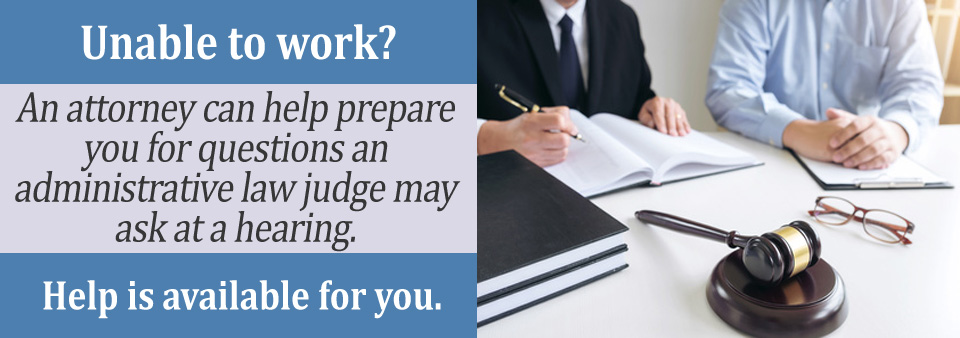If you have applied for Social Security Disability and have been denied, you have the right to appeal the Social Security Administration’s decision. The first step of the appeal process is to request a reconsideration. The claimant will receive a new ruling by someone who had no part in the first decision. Should you still disagree with the decision, you have the right to request a hearing before an Administrative Law Judge (ALJ).
An applicant’s chance of being approved for Social Security Disability Insurance (SSDI) benefits dramatically improve at the hearing level. In fact, the SSA estimates that approximately 50% of disability awards are granted at the appeals hearing.
What Happens at an Appeals Hearing?
Perhaps the most important part of an appeals hearing occurs before the actual ALJ conference. Preparation is of the absolute essence when preparing for your appeals hearing. It is vital that you submit in advance any additional evidence that you would like the ALJ to consider. Your judge will review your file and medical evidence before meeting with you, so it is essential that he or she has all of the information that you wish to have included in your file.
While you probably have a vision of a judge in a robe and a courtroom, your appeals hearing will be nothing like that. Typically, appeals hearings occur in small conference rooms. In addition to yourself and the ALJ, other people present might include a vocational expert or a witness. If you have an attorney or disability advocate, they will also attend your hearing.
Your hearing will typically start with introductions and the ALJ’s statement about your case. Then, depending on the particular judge and your situation, you may be asked to answer additional questions about your disability and functional abilities. If witnesses are present, such as a doctor or vocational expert, they may be invited to speak as well. You will be permitted to submit additional information or make a statement at this time.
Your hearing will last anywhere from fifteen minutes to an hour. The more prepared that you are for the hearing, the quicker it will typically go.

What Types of Questions will the ALJ Ask Me?
There are a variety of questions that the ALJ could potentially ask you during your hearing. The ALJ will likely start with your personal information and background, including your education, skills that you have acquired over the years, and your working history. As you might be nervous, it would be helpful to bring a resume that includes your last fifteen years of work, including dates. Having a paper copy in hand will ensure that you can refer back to it when the ALJ asks questions about your employment history.
The ALJ will also probably ask questions about the history of your health condition, as well as the limitations that have arisen as a result. You might be asked various questions such as how long you are able to stand, how often you need breaks during the day, and how well you communicate with your co-workers.
Honesty and respect are the two most important qualities to bring with you to your hearing. At times, it might feel as though the ALJ is questioning your disability, causing you to feel defensive. Remember that is it the job of the ALJ to determine the working ability of all claimants. Do your best to remain neutral, answering all questions respectfully and calmly.
While you might be inclined to exaggerate your limitations in the hopes of winning approval, do not do this. If the ALJ finds discrepancies in your testimony versus your medical records, your credibility may come into question. Be honest and factual, do not leave any facts out, but do not exaggerate your illness.
Can I Bring a Lawyer to My Appeals Hearing to Speak on My Behalf?
Many claimants bring a representative, such as a lawyer or a disability advocate to assist them on the day of their hearing. An experienced Social Security attorney can help prepare you for the hearing by conducting a “mock hearing.” This means that he or she will pretend to be the judge and ask you questions that the ALJ could potentially ask during the actual appeals hearing.
Further, a disability lawyer is familiar with how appeals hearings work and can help ease any fears or anxieties that you may have that day. While your lawyer can’t answer questions for you, he or she can help you if you become stuck or confused.
Finally, statistics show that claimants who bring a lawyer or disability advocate with them to their appeals hearing have an increased chance of approval.